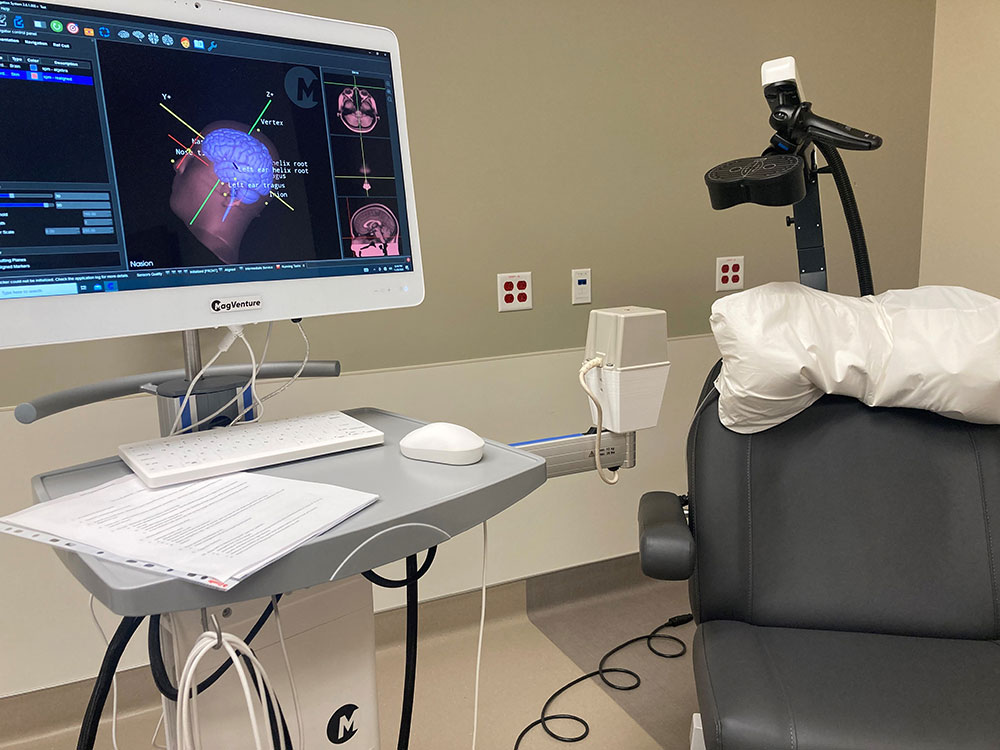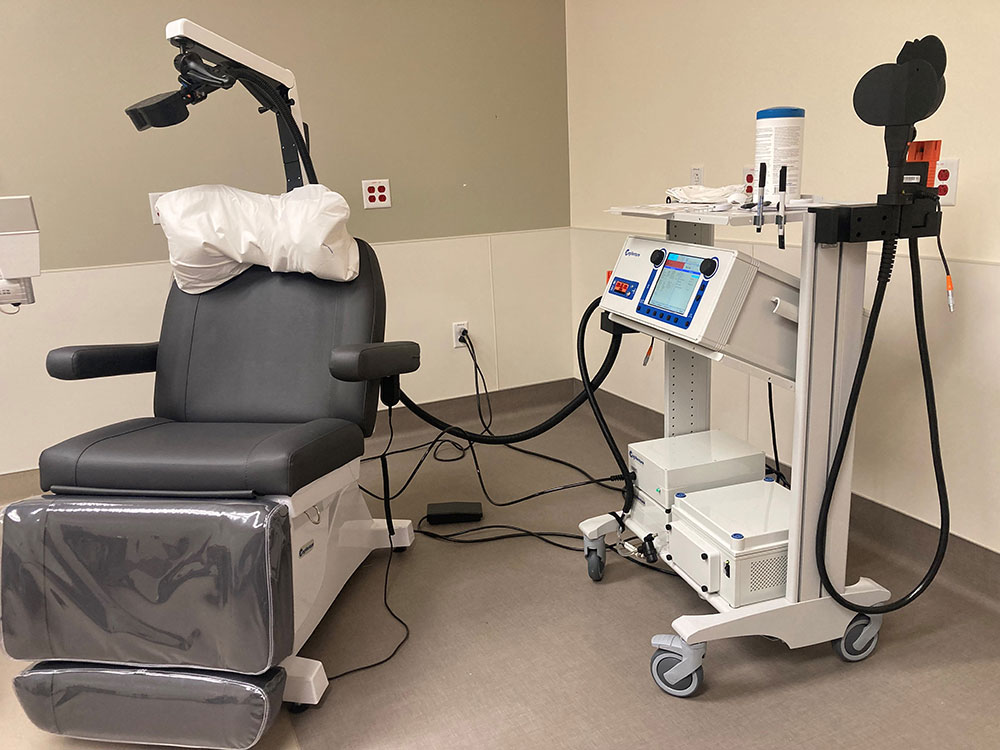Center for Treatment-Resistant Mood Disorders
BCH's highly skilled psychiatrists treat adults suffering from complicated mental illnesses such as treatment-resistant depression, bipolar disorder and schizophrenia.
Treatments offered at this Center
- Transcranial Magnetic Stimulation (TMS)
- Ketamine for Treatment-Resistant Depression
- Electroconvulsive Therapy (ECT)
Referral Form for TMS, Ketamine and/or ECT
Call
303-415-4299 for more information or questions.
Providers at the Center for Treatment-Resistant Mood Disorders (TRMD) conduct exhaustive patient evaluations, which involve:
- Consulting with patients and their families
- Reviewing prior treatment efforts
- Arranging for consultations from other medical disciplines
From this thorough evaluation, we create a treatment plan that may include psychotherapy, psychopharmacology, alternative therapies and, when indicated, electroconvulsive therapy (ECT). Collectively, our psychiatrists have nearly five decades of experience and have performed more than 60,000 ECT treatments, making them the most experienced ECT practitioners in the Mountain States region. We also provide referrals for Ketamine Infusion Therapy and Transcranial Magnetic Stimulation.
BCH providers who perform TRMD include:
Daniel Fisher, MD
Lisa McGloin, MD
William Kromka, MD
Christopher Reyburn, MD
Michael Stanger, MD
Charles Ventriglia, MD
Transcranial Magnetic Stimulation (TMS)
Worldwide, 350 million people have depression. The most common treatment is antidepressants, but those do not work in 1 out of 3 cases. Many patients also give up on antidepressants because of severe side effects.
TMS is a safe, effective type of brain stimulation therapy used to treat major or treatment-resistant depression for adults 18 years and older. This procedure is available at BCH for individuals who have not responded to antidepressants and/or other forms of intervention.
During TMS therapy, an insulated magnetic coil – near a patient’s head - delivers short electromagnetic pulses to target the exact areas of the brain affected by depression. The pulses stimulate and activate neural pathways of the brain that control mood so that the inactive signals begin firing and working again.
The pulses of TMS to the brain areas can be delivered at high or low frequency. Patients do not feel pain or the electric current. After the procedure, potential side effects may include headache, light-headedness, mild discomfort, twitching or tingling in the scalp, or jaw/cheek soreness on the side of the head.
Below are photos of BCH’s TMS treatment room at Della Cava Medical Pavilion.


New Hope: TMS Benefits
In 2008, the United States Food and Drug Administration (FDA) cleared the first TMS device for therapeutic clinical use in Major Depressive Disorder (MDD).
TMS is a well-tolerated treatment option that does not require any anesthesia or surgery. The treatment typically involves daily sessions over several weeks and patients can resume their normal activities immediately following each session.
TMS benefits include:
- Non-invasive, no anesthesia. Increased patient comfort, fewer side effects and greater accessibility to treatment as it does not involve any surgical procedures or incisions.
- Does not affect cognitive function. Patients can continue with their daily activities, immediately after treatment.
- Mild, temporary side effects. They resolve quickly and don’t require any other treatment for a quick healing process.
- This evidence-based treatment can be used in combination with medication, depending on your physician’s evaluation.
- Regain quality of life for yourself or your loved one.
Types of TMS therapy
Our BCH team offers two types of TMS therapy: standard protocol and accelerated protocol. Both treatment plans require significant patient commitment, care coordination, and availability.
-
Standard Protocol:
- Each session typically lasts around 30 minutes.
- Patients undergo TMS treatment five times a week, for six weeks. Limit of one session each day.
-
Accelerated Protocol:
- Each session typically lasts five to 10 minutes.
- Patients undergo hourly TMS treatments for eight to 10 hours a day, for one to two weeks.
For both protocols, a physician attends the first treatment and will follow up with the patient after subsequent treatments. Most treatments will be administered by a trained TMS technician.
During the Procedure:
- Patients are seated in a reclining chair and given earplugs for hearing protection.
- The TMS technician will place an electromagnetic coil against the head and use software to send electromagnetic pulses through the coil to specific areas of the brain.
- Patients may hear clicking sounds or feel tapping on the head.
Ketamine for Treatment-Resistant Depression
Depression (also known as major depression, major depressive disorder or
clinical depression) is a common but serious mood disorder. It causes
severe symptoms that affect how a person feels, thinks, and handles daily
activities, such as sleeping, eating, or working. Depression is usually
treated with medication, psychotherapy, or a combination of the two..png)
Antidepressant medications though don’t work well enough alone or help all patients. Up to a third of patients with depression don’t respond to traditional forms of treatment and often feel like a dark fog will never lift. Ketamine infusions can often be a last resort for some patients who have tried multiple antidepressants – beginning new medications with lots of hope, enduring often-considerable side effects and repeating the process.
BCH offers intravenous (IV) low-dose ketamine infusions as an intervention for people with treatment-resistant major depression (TRD) or treatment-resistant bipolar depression at Della Cava Family Medical Pavilion in the Outpatient Behavioral Health setting. Patients are closely monitored by trained psychiatric professionals.
An acute course of IV ketamine – an anesthetic and dissociative drug - consists of approximately four to eight treatments, two to three times per week. Once the acute treatment phase is completed, maintenance doses are recommended as needed, depending on the patient’s response.
Ketamine infusion has been found to provide rapid relief for patients with hard-to-treat depression and may also be effective in reducing suicidal ideation. While antidepressants could take many weeks to work, IV ketamine often works within hours to days. A 2000 randomized, controlled trial of single-dose intravenous ketamine in people with depression revealed a significant improvement in symptoms within 72 hours (about three days).
Infusions at BCH
To begin ketamine treatment at BCH, each patient must:
-
Receive a referral from a psychiatric provider.
- If you are under the care of a psychiatrist or psychiatric nurse practitioner, your provider can submit a referral for you by calling BCH’s Center for Treatment-Resistant Mood Disorders at 303-415-8638.
- If you are not under the care of a psychiatric provider, call 303-415-8638 to make an appointment at BCH.
- Complete an evaluation with a BCH specific psychiatric provider.
Ketamine infusions at BCH are only available through the self-pay option MDsave. Vouchers can be purchased here. Each infusion has a cost of $651, and no insurance authorizations are required.
Since these treatments require consultations with a psychiatric provider, those services can be billable to insurance. For questions about specific commercial insurance coverage, please consult with your insurance company.
Treatment Inclusions & Exclusions
Research supports that IV ketamine treatments work best for:
- Treatment Resistant Major Depression
- Treatment Resistant Bipolar Depression
- Post-Traumatic Stress Disorder (PTSD)
- Chronic Pain with Depression
The following conditions may prohibit BCH’s ability to offer ketamine treatments:
-
Psychiatric exclusions
- schizophrenia
- schizoaffective disorder
-
Medical exclusions
- pregnancy or breastfeeding
- uncontrolled hypertension
- active substance abuse, with some exceptions
- cardiovascular concerns: Arrythmias, recent history of heart attack, aneurisms, arteriovenous (AV) malformations, and hemorrhagic stroke/intracerebral hemorrhage
History of Ketamine
Beginning in the 1990s, researchers and physicians at Yale Medicine began looking at ketamine as an antidepressant and a possible option for treatment-resistant depression (TRD), which affects early three million people in the United States (Source: National Institutes of Health - NIH).
Studies from Yale Medicine research labs in neuroscience showed that the drug ketamine, which was widely used as anesthesia during surgeries, triggers glutamate release, which, in a cascading series of events, prompts the brain to form new neural connections. This makes the brain more adaptable and able to create new pathways and gives patients the opportunity to develop more positive thoughts and behaviors.
Ketamine earned the distinction of being the first major antidepressant breakthrough in three decades, since it is known to work quickly – potentially within a few hours – and seems to work for patients who have not benefitted from classic antidepressant medications, which could take weeks to take effect. These more standard anti-depressants are of limited help to one third of patients.
Sources: Yale Medicine, National Institutes of Health (NIH), U.S. Food and Drug Administration & Daniel Fisher, MD.
Electroconvulsive Therapy (ECT)
Electroconvulsive Therapy (ECT) is most used to treat severe depression and is often the safest, fastest and most effective therapy available for that illness. ECT is also sometimes used to treat patients with manic illness or schizophrenia. This treatment is available as an inpatient or outpatient basis.
Studies indicate that 60 to 90 percent of depressed individuals who receive ECT treatment respond favorably, making ECT the most effective treatment for all forms of depression. ECT is believed to correct brain biochemical (and even structural) abnormalities that underlie severe depressive illness. The techniques for administering ECT have improved considerably over the past 25 years.
Before ECT begins, a patient’s medical condition is carefully assessed with a complete medical history, physical examination and laboratory tests. The number of treatment sessions needed to successfully treat severe depression ranges from six to 18 for most patients. The treatments are usually given three times per week on Mondays, Wednesdays and Fridays.
ECT is performed under general anesthesia, meaning patients are in a sleep-like state and unaware the procedure is taking place. During the procedure, electrical currents are quickly passed through the brain to induce a brief seizure. This causes changes in the brain’s chemistry, which has beneficial mood effects.
Breaking the ECT Myths
Unfortunately, because of the way it has been portrayed in movies and TV shows, some people have the wrong impression of ECT. As a result, the therapy isn’t helping as many people as it could. Such misconceptions are based on early ECT treatment, which began more than 80 years ago. In the early days, when it was known as “electroshock therapy,” treatment could be very painful and cause serious side effects. Today, ECT is much safer. It’s now delivered in a controlled setting, with patients surrounded by a team of specialized psychiatrists, anesthesiologists and registered nurses.
Why Choose BCH for ECT?
At BCH, ECT services are provided by the Guerra Fisher Institute and offer:
- The most experienced practitioners in the Mountain States region: Collectively, our psychiatrists have nearly five decades of ECT experience and have performed more than 60,000 treatments.
- Seasoned ECT nurses: Our team of registered nurses have subspecialty training in ECT and an average of over 10 years of experience.
- A commitment to collaborating with referring clinicians: Our psychiatrists work closely and constantly communicate with patients’ referring clinicians, striving for seamless integration of care.
- A leading health care system: Located on the Foothills Medical Campus, our program offers access to the full resources of Foothills Hospital. And, it’s the only program in Boulder County operated by a nonprofit health system.
